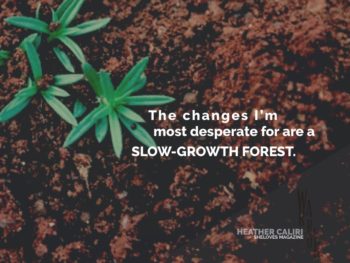When I saw the title of Michelle DeRusha’s memoir, Spiritual Misfit, I knew I had to read it. So much of the good things in my faith recently have flowered because I’ve come to terms with having a quirky, mysterious, and cobbled-together faith. I really recommend her book. Michelle manages to make faith and doubt seem everyday, approachable, and funny–no easy task. I was so honored to ask her questions and ponder her responses. I think you will be too.
Asking yourself a simple question about believing in God—why not?–transformed your faith. I too have been knocked sideways by the power of a few deceptively easy questions. What is it about questions that’s so transformative?
We are not typically encouraged to ask questions in society—or, partly, in Christian culture. We hear Biblical stories and what our minister tells us, and we are expected to take that as absolute fact. And move on.
I was not able to do that. I am a questioning, skeptical person in my soul. I like digging into things. So I had a lot of question about God, Jesus, heaven, and hell.
I squelched them.
And as time passed, I drew further away from God.
It was only when I gave myself permission to ask questions that things changed. I asked, “Why not consider faith?”
I was a non-believer that pretended that I had faith. Even admitting that I was not a believer was a major turning point.
You can’t begin to believe in God until you’re come clean.
It’s funny, I had been taught to not ask questions as a believer, so when I became an unbeliever, I didn’t question that either. Unbelief became my identity.
When I asked, “Why not?” it turned my whole identity upside down.
You talk about how your view of faith was either blind faith or nothing—very black or white. I too have been held in thrall by this kind of all or nothing thinking, and find it’s a hard habit to break. How do we do that, day by day?
I still struggle with black and white thinking. It’s how my brain works—I’m very concrete and structured. I’m always looking for a definitive answer.
Allowing myself to experience the mystery of God, allowing myself to accept that mystery can and does exist—that God is bigger, broader, deeper, more indefinable than we can imagine.
When I was a kid, we went to Mass on Saturday nights, and the priest said something that still percolates through my brain. I think it was when the priest raised the chalice during the Eucharist.
He’d say, “Let us proclaim the mystery of faith.”
We’d repeat back: “Christ died, Christ is risen, Christ will come again.”
I find myself, now that I’m not a Catholic, coming back to that phrase. The fact that Christ died, rose, and will come again is a beautiful mystery.
When you mentioned Martin Luther’s critique of people who analyze the Bible as a means to control it really resonated with me—so much of my struggle to read the Bible in the past few years has been a struggle to move past that attitude. I also think Westerners struggle with this sort of rational stance in general. What habits, attitudes, or practices have been helpful in transforming how you read the Bible?
I try—though I’m not great at it—to practice lectio divina. It’s a monastic practice, reading Scripture very slowly, thoughtfully, with an open mind and spirit. To focus on the Holy Spirit speaking to you.
Lectio helps my analytical brain to stop working so hard. To rest.
I also try to read Scripture out loud. But I do that when I’m alone, so no one will think I’m a crazy lady.
Reading aloud helps me listen to the soothing nature of the words, and concentrate on them, rather than analyzing them to death.
I have long identified passage about Jacob wrestling with God; faith has also been a struggle for me. Yet both you and I struggled with accepting the fact that our faith did not look smooth and unruffled. Why do we have problems accepting this metaphor of faith?
A blogging friend of mine emailed me after she read my book and admitted that at first, she could not deal with me being such a blatant questioner. She did not understand my volatile faith history. It challenged her faith too much, and scared her.
It was brave of her to admit that.
Wrestling and struggling is the underbelly of faith. It’s never easy. It’s choppy, gritty, and ugly. It’s natural for us to be afraid of that.
When you see someone struggling, you thank God you’re not in the same place.
We always want to find community. We ask: Where is our place? Where are our people/ Where are we comfortable?
If we’re comfortable in our faith, and feeling secure, then that’s a particular place. The people who are on the fringe are the other, and different, and they’re harder for us to relate to.
My friend didn’t understand or appreciate why I was writing about what I experienced until she walked through a period of doubt and struggle herself. Then, suddenly, she could relate.
Towards the end of the book, you wrestle with the dichotomy of the practice of faith: being faithful with church, Bible study, spiritual disciplines—and the grace of God: knowing we don’t have to do anything to experience His presence. I find that tension really hard to navigate.
This past week or month, how have you been experiencing that tension?
I’m a little more fluid than I was when I wrote the book. I will always be the person who has a list and checks thins off from it. My husband calls me triple type A for a reason. Going to church regularly, trying to read scripture regularly, doing community service—I like to do those things, and some days, a part of me feels like I have to do them.
I have grown, and am more able to rest in God’s grace.
For example, I decided, in a big announcement, that I was going to practice the Sabbath. I was super hard-core. I came up with a list of things I wasn’t going to do: housework, laundry, shopping. Instead, I was going to do things that brought me joy and rest.
I’d settled into that routine, mostly, when one Sunday, I told my husband I was going to make cookies for a neighbor.
Then I stopped. “Oh, it’s Sunday, and I don’t have the ingredients! I can’t go to the store.”
Brad looked at me, and said, “You’re kind of missing the point. If doing something for somebody gives you joy, then do it, you’re following the letter of the law, instead of the spirit.”
Then he reminded me that the Sabbath was made for man, not man for the Sabbath.
It’s a very freeing verse.
My husband reminded me that spiritual disciplines, while good in and of themselves, can also blind me to the freedom Jesus intended.
I return often to Jesus’ words about being free in him. Handing over my burdens is very liberating.
 Michelle DeRusha is the author of Spiritual Misfit, and writes a monthly column on religion and spirituality for The Lincoln Journal Star and has published a number of articles and personal essays in both print and online media. She also writes a blog, MichelleDerusha.com. She and her husband, Brad, live in Nebraska with their two boys and pet lizard.
Michelle DeRusha is the author of Spiritual Misfit, and writes a monthly column on religion and spirituality for The Lincoln Journal Star and has published a number of articles and personal essays in both print and online media. She also writes a blog, MichelleDerusha.com. She and her husband, Brad, live in Nebraska with their two boys and pet lizard.
Image credit: Fr Lawrence Lew, O.P.














 When ‘nothing’ happens: Why I’m a feminist
When ‘nothing’ happens: Why I’m a feminist
Wow, Heather, you did a really good job of capturing my rambling and editing it into cohesiveness! Thank you for that, and thank you, too, for your thoughtful and probing questions. I really enjoyed our chat that day, and I so appreciate your interest in Spiritual Misfit and your support of the book here today!
Hah! I didn’t find you rambling at all. What a fun conversation 😉
I love it when two of my current favorite writers intersect in conversational goodness. I enjoyed your book Michelle and appreciated your thoughtful questions Heather. Faith is such a personal thing and yet, it must be doctrinally sound. Navigating the ‘gray’ areas and being able to articulate to ourselves what our faith means and why we believe what we believe moves us into a pocket of peace that I found to be an easy, natural and comfortable place from which to move in our world. Thanks to both of you for embracing the tough reality of ‘working out our salvation’ (Phil 2:12)
Thanks, Tamara! I’m so glad to have been able to dialogue with Michelle–getting real–really real!–about faith is so incredibly fraught. I’m thankful to be talking to people who are helping us all come out of the shadows.
I really like the way you articulated this, Tamara (and thanks for your kinds words, too!}.
Love this post Michelle,
I probably seem to
always say I love your post when I make a comment and truth be told I confess I
usually due to computer restricted time only take the time when I read
something in the post that resonates for me. So I love when that happens!
Now to begin
Scripture has been a part of my life since I was very small Prayer books when I
was a 3 year old. My first Bible was a Christmas gift at age five. I went to a
Lutheran School for some years we had to memorize and recite Scriptures out
loud for our religion assignments.
I remember hours
spent writing and memorizing those Scripture verses. But now as an adult I
praise God that was part of my learning because it has become my greatest
comfort and Joy!
I believe in
reading Scripture out loud because of “the words of my mouth” Are
able to protect me from the snares of the evil one as I proclaim my faith in
Christ by speaking out loud the words of Scripture. And I am more than willing
to be crazy for and with Christ.
Lectio Divina is
one of my favorite forms of prayer and Scripture meditation.
Thanks for this, Marie! It’s so lovely to hear how God protects you and encourages you through your study of the Word 🙂
I love this, Marie – I love your faith and your faithfulness to the Word!
Great interview, you two! Thanks so much.
Thanks, Diana!